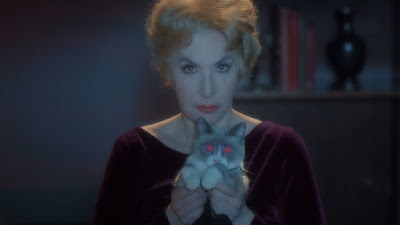PROFILE: What Kind of Art Will Hold a Viewer's Attention? "My Art" [Preview]
Laurie Simmons’ My Art stars the celebrated photographer as Ellie, a single, childless art professor of middling art-world success (ironically enough), who leaves New York City for a friend’s upstate country house to spend a summer on her own work. And that work? Recreating scenes from classic films like The Misfits (1961), Some Like it Hot (1959), Jules and Jim (1962), and A Clockwork Orange (1971), mostly through projecting backdrops onto a sheet in the attic and donning the appropriate wig or set of accessories for maximum verisimilitude. Initially insisting upon working alone, free from anyone else giving her ideas (a request which ultimately goes ignored several times over the course of My Art), Ellie gradually brings a Frank, widowed gardener with dreams of acting (Robert Clohessy) and John, a self-important lawyer (John Rothman) into the fold. As she prepares to film a Misfits scene, she tells Frank (who’s already wearing the requisite cowboy hat): “you can never be Clark Gable. I can never be Marilyn Monroe. It’s exactly about the impossibility of us ever being able to be them. We can never be them… but let’s just try.”
At once both episodic and strongly narrative-driven in nature, My Art, ultimately, is about the art of performance, and of the possibility of self-(re)invention. Ellie is a performance artist by trade, and a complicated protagonist in her own right. Firmly ensconced in the New York art world, initially she bristles at the attention Frank and the upstate locals give her as the archetypal new girl in town, undoubtedly seeing them as stereotypically provincial and nosy small-town folk. Her reaction is obviously easy to understand: she came to the country house to focus on her work, on developing herself as an artist. Yet over the course of collaborating with Frank, John, and eventually others, Ellie finds herself warming to the feeling of spending meaningful time with other people, realizing that being a fiercely independent artist is not synonymous with being alone. She even falls into bed with Frank, whose affection for her is palpable, and which she seems to return in her own way.
Or does she? When the opportunity to show her work in the city arises, Ellie reverts to her brusque, prickly self. As she quickly sheds the personable skin she’s adopted over the summer, the shift provides a sense of emotional whiplash both diegetically and extradiegetically. When Frank comes to see her show in the city, he’s rendered just as awkward and hesitant around her as the day they met. Simmons leaves us ambivalent in the end; we’re unsure of how Ellie actually conceives of the events of that summer, and whether her change in worldview was legitimate or merely a performance.
You can read the rest of this piece at PopMatters!
 |
| (https://www.artforum.com/film/david-frankel-on-laurie-simmons-s-my-art-67908) |
Or does she? When the opportunity to show her work in the city arises, Ellie reverts to her brusque, prickly self. As she quickly sheds the personable skin she’s adopted over the summer, the shift provides a sense of emotional whiplash both diegetically and extradiegetically. When Frank comes to see her show in the city, he’s rendered just as awkward and hesitant around her as the day they met. Simmons leaves us ambivalent in the end; we’re unsure of how Ellie actually conceives of the events of that summer, and whether her change in worldview was legitimate or merely a performance.
You can read the rest of this piece at PopMatters!
Comments
Post a Comment